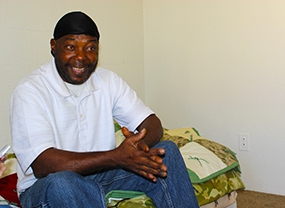For Donovan, 47, a man used to making his own way in the world, the apartment provides basic needs: shelter, a mattress to sleep on, a small kitchen, bathroom and a welcome sense of safety—thanks to a partnership between Valley of the Sun United Way, the City of Phoenix, Maricopa County and philanthropic organizations in the Funders Collaborative.
“I can make a hot meal and take a shower,” he said. “And I can rest without someone hitting me on the head and taking my stuff.”
Not that Donovan has much idle time to rest these days. He travels 2-3 hours by bus each way to his job at an e-commerce fulfillment center where he works nights and happily takes on extra shifts when needed. His goal is to fully reclaim the self-sufficient life he once knew.
Donovan, who emigrated to the U.S. from Jamaica, began supporting himself at the age of 16. Over the next 25 years, he worked successfully in a variety of jobs—from heating and cooling to grounds keeping at a Hilton hotel. He furnished his apartments and paid his rent on time.
After moving to Phoenix in 2005, he worked at a trucking company before landing a job as a ramp lead at Sky Harbor airport—a job that requires coordinating the activities of ground crew in the loading, unloading, securing, and staging of aircraft cargo or baggage.
When the crew was shorthanded, he worked overtime to fill in. The long hours began to take a toll on his health.
“My mind kept saying ‘go, go, go,’ but my body was saying ‘stop, stop, stop,’” he recalls.
Physically and mentally fatigued, his blood pressure and cholesterol dangerously off the charts, he feared suffering an accident on the job and putting other people at risk. He felt no choice but to quit.
Debilitating health and loss of income led to losing his home and pushed him to live on the streets. He ended up spending five years sleeping in the parking lot area of the Men’s Overflow Shelter (MOS). The nearby Human Services Campus connected him to counseling services to deal with his stress and his diet. In time, his health returned.
He spent long hours at the public library searching and applying for jobs—competing against hundreds of others in his same situation—finally earning a new temporary job and starting a fresh chapter in his life.
United Way, its partner agencies and supporters provided him with a place to live, an opportunity to restore him to the man he has always been inside.
“[On the streets] you have to be rough, be tough sometimes so they don’t run you over,” he says. “People on the outside don’t know about that kind of life, so I don’t want to carry that attitude over. I want to be more caring, softer and understanding.”

